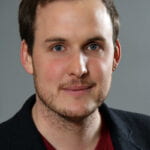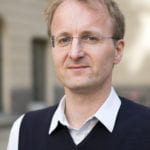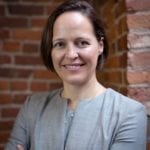 Frank Schilbach is an associate professor of economics at MIT, where he teaches behavioral and development economics. Frank’s main strand of research studies the impact of poverty and its correlates on cognitive function, decision-making, and productivity. His recent work investigates the role of sleep deprivation, financial strain, alcohol consumption, and mental health in the economic lives of low-income workers in India. Frank’s second strand of work investigates knowledge diffusion within and across households.
Frank Schilbach is an associate professor of economics at MIT, where he teaches behavioral and development economics. Frank’s main strand of research studies the impact of poverty and its correlates on cognitive function, decision-making, and productivity. His recent work investigates the role of sleep deprivation, financial strain, alcohol consumption, and mental health in the economic lives of low-income workers in India. Frank’s second strand of work investigates knowledge diffusion within and across households.
Seminar
Weekly Seminar: Isabelle Brocas, “Dynamic Coordination in Efficient and Fair Strategies: A Developmental Perspective”, Thursday, March 31, 2022

Isabelle Brocas is a Professor at the University of Southern California and the co-director of the Los Angeles Behavioral Economics Laboratory (LABEL) and the Theoretical Research in Neuroeconomic Decision-making (TREND) Institute. Her research is both theoretical and experimental and it revisits standard theories of decision-making to better understand how people make choices, what motivates them and what cognitive limitations prevent them from being rational. She is particularly interested in the underlying biological mechanisms that support decision-making and how they change over the life cycle.
Weekly Seminar: Peter Schwardmann, “Anticipatory Anxiety and Wishful Thinking ”, Thursday, March 10, 2022
 Peter is a behavioral economist. Much of his research is concerned with why people so frequently hold biased beliefs about themselves and the world around them. He is also interested in how biased beliefs shape outcomes in markets and affect how we communicate. His research uses both laboratory and field experiments. Prior to joining CMU, he was an assistant professor at the University of Munich (LMU). He received his PhD from the Toulouse School of Economics and completed his undergraduate studies at the University of Cape Town.
Peter is a behavioral economist. Much of his research is concerned with why people so frequently hold biased beliefs about themselves and the world around them. He is also interested in how biased beliefs shape outcomes in markets and affect how we communicate. His research uses both laboratory and field experiments. Prior to joining CMU, he was an assistant professor at the University of Munich (LMU). He received his PhD from the Toulouse School of Economics and completed his undergraduate studies at the University of Cape Town.
Weekly Seminar: Georg Weizsäker, “Coaudience Neglect”, Thursday, September 9, 2021
 Georg Weizsäcker is a behavioral economist and professor of microeconomics at Humboldt-Universität zu Berlin. He works on diverse topics of economics and with methods that include experiments, surveys and microeconomic theory. He received his PhD at Harvard and has subsequently worked at LSE and UCL in London, as Lecturer, Reader, and Professor. Georg will be a visitor in our Economics department until March 2022.
Georg Weizsäcker is a behavioral economist and professor of microeconomics at Humboldt-Universität zu Berlin. He works on diverse topics of economics and with methods that include experiments, surveys and microeconomic theory. He received his PhD at Harvard and has subsequently worked at LSE and UCL in London, as Lecturer, Reader, and Professor. Georg will be a visitor in our Economics department until March 2022.
Weekly Seminar: Chad Kendall, “On the Complexities of Model Inference”, Thursday, May 6, 2021
 Decision makers must often infer patterns, causal processes, and other algorithms from data. For instance, decision makers have to use data to extract models of how other people behave (habits, norms, and strategies in games) and more generally of how natural processes, organizations and social systems unfold. Even if these inference problems are deterministic, they can nonetheless be difficult due to the underlying complexity of the process. We report experiments in which we identify the features of algorithms that make them difficult for people to infer from data. Subjects in our experiment are given strings of “inputs” and “outputs”, generated by a rule (a finite state machine), and are asked to infer the rule. We introduce new methods to elicit these inferences directly, and use structural models to infer them from choices. Using this data, we compare several complexity metrics, identifying those that best predict both the models that people are able to extract, and those that they tend to select.
Decision makers must often infer patterns, causal processes, and other algorithms from data. For instance, decision makers have to use data to extract models of how other people behave (habits, norms, and strategies in games) and more generally of how natural processes, organizations and social systems unfold. Even if these inference problems are deterministic, they can nonetheless be difficult due to the underlying complexity of the process. We report experiments in which we identify the features of algorithms that make them difficult for people to infer from data. Subjects in our experiment are given strings of “inputs” and “outputs”, generated by a rule (a finite state machine), and are asked to infer the rule. We introduce new methods to elicit these inferences directly, and use structural models to infer them from choices. Using this data, we compare several complexity metrics, identifying those that best predict both the models that people are able to extract, and those that they tend to select.
Weekly Seminar: Katherine Milkman, “Mega-Studies Improve the Impact of Applied Behavioral Science”, Thursday, April 29, 2021
 Increasingly, policymakers are turning to behavioral science for insights about how to improve citizens’ decisions and outcomes. However, these insights can only inform policy insofar as they are comparable—and unfortunately, different intervention ideas are typically tested across different samples on different outcomes over different time intervals. Here we introduce the “mega-study,” a massive field experiment in which the effects of many different interventions are compared in the same population on the same objectively measured outcome for the same duration. In a mega-study targeting physical exercise among 61,293 members of an American fitness chain, 30 scientists from 15 different U.S. universities worked in small, independent teams to design a total of 54 different four-week digital programs encouraging exercise (or “interventions”). We show that 45% of these interventions significantly boosted weekly gym visits by 9 to 27%; the top-performing intervention offered micro-rewards for returning to the gym after a missed workout. Although only 8% of interventions created behavior change that was significant and measurable after the four-week intervention, in aggregate, we detect carry-over effects that are proportionally similar to those measured in prior research. Forecasts by impartial judges failed to predict which interventions would be most effective, underscoring the utility of mega-studies to improve the evidentiary value of behavioral science.
Increasingly, policymakers are turning to behavioral science for insights about how to improve citizens’ decisions and outcomes. However, these insights can only inform policy insofar as they are comparable—and unfortunately, different intervention ideas are typically tested across different samples on different outcomes over different time intervals. Here we introduce the “mega-study,” a massive field experiment in which the effects of many different interventions are compared in the same population on the same objectively measured outcome for the same duration. In a mega-study targeting physical exercise among 61,293 members of an American fitness chain, 30 scientists from 15 different U.S. universities worked in small, independent teams to design a total of 54 different four-week digital programs encouraging exercise (or “interventions”). We show that 45% of these interventions significantly boosted weekly gym visits by 9 to 27%; the top-performing intervention offered micro-rewards for returning to the gym after a missed workout. Although only 8% of interventions created behavior change that was significant and measurable after the four-week intervention, in aggregate, we detect carry-over effects that are proportionally similar to those measured in prior research. Forecasts by impartial judges failed to predict which interventions would be most effective, underscoring the utility of mega-studies to improve the evidentiary value of behavioral science.
Weekly Seminar: Catherine Eckel, “The Democratic Peace: An Experimental Test of a Causal Relation and of Underlying Mechanisms”, Thursday, April 22, 2021
 Democracies go to war with each other less frequently than dictatorships do with each other. This is an established empirical regularity. However, it is not clear whether there is a causal link between democracy and peace. We use laboratory experiments to study whether there is a causal impact. We study the bellicosity of democracies compared with two types of dictatorships, inclusive and exclusive, where each society is composed of three members. We also analyze how bellicosity depends on the presence of the possibility of deliberation between the members of a society. Neither the ‘voting’ nor ‘inclusion’ aspect of democracy nor ‘deliberation’ in isolation has a positive causal impact on peace. However, when all three are combined, there is evidence that their combination produces less bellicosity than some kinds of dictatorship. It is the addition of deliberation that makes the crucial distinguishing difference for democracy in our experiment.
Democracies go to war with each other less frequently than dictatorships do with each other. This is an established empirical regularity. However, it is not clear whether there is a causal link between democracy and peace. We use laboratory experiments to study whether there is a causal impact. We study the bellicosity of democracies compared with two types of dictatorships, inclusive and exclusive, where each society is composed of three members. We also analyze how bellicosity depends on the presence of the possibility of deliberation between the members of a society. Neither the ‘voting’ nor ‘inclusion’ aspect of democracy nor ‘deliberation’ in isolation has a positive causal impact on peace. However, when all three are combined, there is evidence that their combination produces less bellicosity than some kinds of dictatorship. It is the addition of deliberation that makes the crucial distinguishing difference for democracy in our experiment.
Weekly Seminar: Sabine Kröger, “Optimal Frequency of Portfolio Evaluation in a Choice Experiment with Ambiguity and Loss Aversion”, Thursday, April 8, 2021
 Sabine Kröger is a professor of behavioural economics at the Economics Department of Laval University (Québec, Canada). Her research focuses on decision-making under uncertainty, documenting how social norms, emotions and cognitive shortcuts affect decision-making. She is the founder and director of the Laval Experimental Economics Laboratory. Her research covers amongst others the applications of behavioural insights on regulatory policy.
Sabine Kröger is a professor of behavioural economics at the Economics Department of Laval University (Québec, Canada). Her research focuses on decision-making under uncertainty, documenting how social norms, emotions and cognitive shortcuts affect decision-making. She is the founder and director of the Laval Experimental Economics Laboratory. Her research covers amongst others the applications of behavioural insights on regulatory policy.
Weekly Seminar: Antonio Cabrales, “What Does Make People Nice: A Common Identity, a Common Interest, a Large Shock?”, Thursday, March 25, 2021
 Antonio Cabrales has a Ph.D. in Economics from UCSD and a is professor at Universidad Carlos III. He has been a professor at UCL, and at UPF. He is Executive Vice President of the European Economic Association and former President of the Spanish Economic Association. He has worked in a wide range of topics: game theory, the economics of networks, mechanism design, economics of education, experimental and behavioral economics. He is associate editor of the Journal of Economic Theory and was editor of BEPress JEAP and Investigaciones Económicas, and associate editor of JEEA and SERIEs. He has published in journals such as American Economic Review, Journal of Political Economy, Review of Economic Studies, Review of Financial Studies. Management Sciences, and Physical Review Letters. More information about his work and copies of his papers at: http://www.ucl.ac.uk/~uctpcab/
Antonio Cabrales has a Ph.D. in Economics from UCSD and a is professor at Universidad Carlos III. He has been a professor at UCL, and at UPF. He is Executive Vice President of the European Economic Association and former President of the Spanish Economic Association. He has worked in a wide range of topics: game theory, the economics of networks, mechanism design, economics of education, experimental and behavioral economics. He is associate editor of the Journal of Economic Theory and was editor of BEPress JEAP and Investigaciones Económicas, and associate editor of JEEA and SERIEs. He has published in journals such as American Economic Review, Journal of Political Economy, Review of Economic Studies, Review of Financial Studies. Management Sciences, and Physical Review Letters. More information about his work and copies of his papers at: http://www.ucl.ac.uk/~uctpcab/
Weekly Seminar: Georg Weizsäcker, “Biased Wage Expectations and Female Labor Supply”, Thursday, March 18, 2021
 Georg Weizsäcker is a behavioral economist and professor of microeconomics at Humboldt-Universität zu Berlin. He works on diverse topics of economics and with methods that include experiments, surveys and microeconomic theory. He received his PhD at Harvard and has subsequently worked at LSE and UCL in London, as Lecturer, Reader, and Professor.
Georg Weizsäcker is a behavioral economist and professor of microeconomics at Humboldt-Universität zu Berlin. He works on diverse topics of economics and with methods that include experiments, surveys and microeconomic theory. He received his PhD at Harvard and has subsequently worked at LSE and UCL in London, as Lecturer, Reader, and Professor.